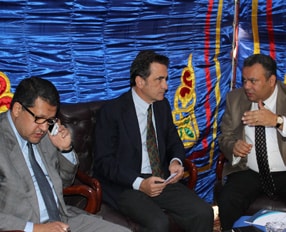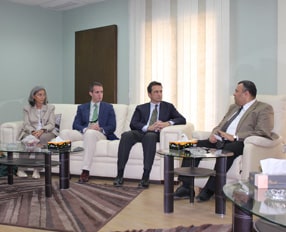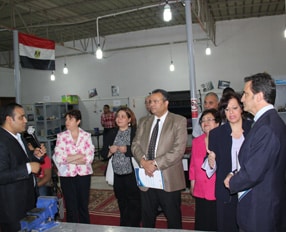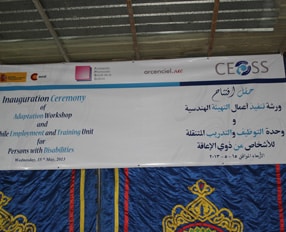
Fidel Sendagorta, the Spanish Ambassador in Egypt introduced a project and a mobile unit in Cairo aimed at improving the intergration of the disabled people through accessibility. The project is funded by the AECID and executed by the FPSC and its partners in 4 countries of the Middle East: Lebanon, Syria, Jordan and Egypt.
The opening ceremony of the project took place on the 15th of May 2013 in the slums of Cairo. The project introduces tools that are aimed at helping disabled people in Egypt: The mobile unit, which promotes the training and the employment of people with disabilities and a Project of Adaptation to make physical spaces accesible. Both facilities has been financed by AECID dedicated to improve the integration of the disabled people in the Middle East.

Among others, ones present were the Spanish Ambassador, Mr Fidel Sendagorta, the General Coordinator of AECID in Egypt, Ms. Maria Cruz Ciria, and the AECID Project Manager in Egypt, Mrs. Rashideh Youssef. The opening ceremony was also attended by the representatives from the Egyptian civil society, NGOs and the beneficiaries of the Convention.
The FPSC´s Egyptian partner, CEOSS, introduces the first Egyptian project focused on the adaptation to physical spaces and the removal of architectural barriers. This project will implement at least 12 different models of accessibility to public spaces. Besides, it offers employment to a number of people with disabilities.

The project, which is carried out in an industrial area in the slums of Cairo, consists of a team of people with disabilities who have followed several training courses offered by the lead partner of the Convention, the Lebanese Arcenciel. This approach is intended to remove barriers, ensure greater independence, mobility and promote the rights of disabled people to employment and the access to public spaces.
The mobile unit which aims at promoting the employment of people with disabilities is in the meanwhile also a pioneering initiative in Egypt. The minibus has become a mobile office and is able to access the most inaccessible areas of the Egyptian capital. It identifies candidates with special needs and puts them in touch with companies and professionals who are willing to train or/and hire those people.

The interventions were carried out in several communities of Cairo, mainly in Shubra, Caliph, El Sayeda Zeinab, Shubra Al Khaimah and The Qanater, in coordination and collaboration with CBOs (Community Based Organizations) and civil society representatives

